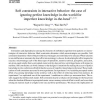Free Online Productivity Tools
i2Speak
i2Symbol
i2OCR
iTex2Img
iWeb2Print
iWeb2Shot
i2Type
iPdf2Split
iPdf2Merge
i2Bopomofo
i2Arabic
i2Style
i2Image
i2PDF
iLatex2Rtf
Sci2ools
COGSCI
2004
2004
Soft constraints in interactive behavior: the case of ignoring perfect knowledge in-the-world for imperfect knowledge in-the-hea
Constraints and dependencies among the elements of embodied cognition form patterns or microstrategies of interactive behavior. Hard constraints determine which microstrategies are possible. Soft constraints determine which of the possible microstrategies are most likely to be selected. When selection is non-deliberate or automatic the least effort microstrategy is chosen. In calculating the effort required to execute a microstrategy each of the three types of operations, memory retrieval, perception, and action, are given equal weight; that is, perceptual-motor activity does not have a privileged status with respect to memory. Soft constraints can work contrary to the designer's intentions by making the access of perfect knowledge in-the-world more effortful than the access of imperfect knowledge in-the-head. These implications of soft constraints are tested in two experiments. In experiment 1 we varied the perceptual-motor effort of accessing knowledge in-the-world as well as t...
| Added | 17 Dec 2010 |
| Updated | 17 Dec 2010 |
| Type | Journal |
| Year | 2004 |
| Where | COGSCI |
| Authors | Wayne D. Gray, Wai-Tat Fu |
Comments (0)

